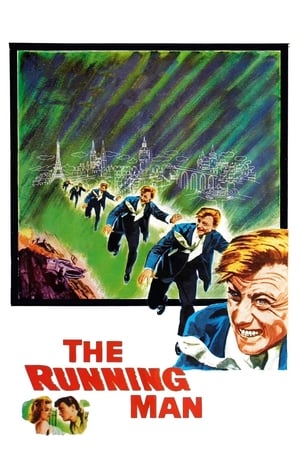
The Running Man
Say The Running Man and most people think of a not particularly good Arnold Schwarzenegger sci-fi/action movie from 1987. But there is another one, from 1963, starring Laurence Harvey, Lee Remick and Alan Bates, and it’s all about a man who gets a sniff of money and it drives him nuts. The action kicks off in London, where grieving widow Stella (Remick) is making a great show of burying her much loved husband, who recently died in a glider accident off the south coast. But Rex (Harvey) isn’t dead, and the staged accident was part of a scheme to get one over on the insurance company who had, Rex feels, got one over on him by not paying out when he had an earlier plane crash. The fact that the policy had expired and so he wasn’t insured at all doesn’t seem to have entered Rex’s distortion field, but then there is much about Rex that isn’t quite right. Rex and Stella’s brief London reunion is interrupted by the arrival of Stephen (Bates), an insurance salesman who has a few questions about the accident (no body, see) and the policy. But this one is valid, it turns out, so the company does pay up and Stella has soon joined Rex in Spain, where he now has a new identity as an Australian sheep farmer, is swanking about in a big American car and is generally chucking money about. The end. No, actually, that’s the beginning. Spain is where the action really gets going, when the couple, now posing as two people who have just met, bump into Stephen, who just happens to be on holiday out there, or so he says. A neat who’s-zooming-who thriller takes wing, spiced up by the fact that Stephen has the hots for Stella, and Stella might have them for him too, or is she just trying to make her increasingly boorish husband take notice of her? This is a film designed as a blockbuster, from its James Bond-like title sequence by Maurice Binder, to its bright, colour-soaked “all the lights on” look of a sort favoured by Blake Edwards (The Pink Panther came out the same year) and a noirish North by Northwest-y score by William Alwyn (this was his last). The director is in fact Carol Reed, who’s reunited with his The Third Man cinematographer Robert Krasker for a demonstration that they have other strings to their bow – no sign of expressionist tilting angles here, though the whole initial set up of a man presumed to be dead who actually isn’t is distinctly Third Man-ish. Reed and Krasker give us the dusty, sun-baked south of Spain just as tourism was getting underway – it’s still old ladies dressed in black, donkeys and urchin kids begging for pesetas – and there is a lot of it. It worked in post-War Vienna in The Third Man, where the devastated city added edge to a story about wretched people. Here… not so much. Reed gives us so much Spain – flamenco, bull rings etc – that there’s not much room left for tension. It’s an interesting role for Harvey. Rex is a massively entitled, barely likeable man from the moment he arrives on the screen, and become increasingly self-centred and self-regarding as the film goes by. The money goes to his head. Harvey already had Room at the Top, Butterfield 8 and The Manchurian Candidate under his belt when he made this, and though he probably hadn’t realised it, his star prestige was already slipping. Aloof unsympathetic characters aren’t what audiences want to see, though doesn’t he play them well? Remick is the best thing in the film, still girlish, supple and capable of nuance, before that staring, Stepford transformation later in her career. Bates plays it as straight as he can as the straightforward guy whose every word might be bogus. The scaffolding of the story is sound and the predicament of three people winding themselves further towards an apocalypse by sticking absolutely to their stories – the widow, the sheep farmer, the holidaymaker – gives the film its edge and its claim on your time. Not bad at all, though a certain nostalgia for films of this era does help.
